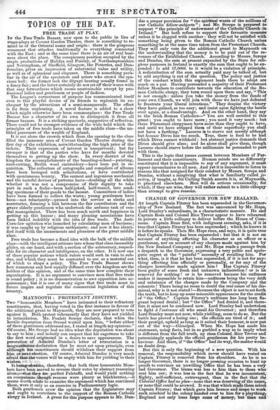TOPICS OF THE DAY.
FREE TRADE AT PLAY.
IN the Free Trade Bazaar, now open to the public in lieu of stage-plays at Covent Garden Theatre, there is something to re- mind us of the Oriental name and origin : there is the gorgeous ornament that attaches traditionally to everything connected with the East ; and at the same time there is an air of real busi- ness about the place. The conspicuous position occupied by the staple productions of Halifax and Paisley, of Northamptonshire and Nottingham, of Sheffield, Glasgow' the Potteries, and Dun- fermline, gives an impression of substantial value and utility, as well as of splendour and elegance. There is something pecu- liar in the air of the spectators and actors who crowd the spa- cious hail: the former lack the degage bearing usually found in a fancy fair; and the latter certainly do not set off their wares with that easy forwardness which seems unattainable except by pro- fessional ladies and gentlemen or people of fashion. The League's earnestness of purpose has communicated itself even to this playful device of its friends to replenish its ex- chequer by the attractions of a semi-masquerade. The effect is far from unpleasing. A novel feature is added to a show which might otherwise have been commonplace : the Free Trade Bazaar has a character of its own to distinguish it from all former bazaars. It is a striking spectacle suggestive of reflection. There could not be stronger evidence of the wide hold which the principles of free trade have taken on the middle class—the un- titled possessors of the wealth of England. It is not alone the crowds which from the opening to the close filled the immense area of Covent Garden Theatre during the first day of the exhibition, notwithstanding the high price of the tickets. Their expression of interest is unequivocal ; but far stronger is that of the parties who have for months devoted themselves to getting- up the show. In every district of the kingdom the accomplishments of the boarding-school—painting, card-cutting, Berlin wool embroidery—have been put in re- quisition. The collectors of autographs and compilers of albums have been besieged with solicitations, or have contributed with spontaneous bounty. The earnest and ingenious mechanist and the tasteful deviser of patterns have—doubting all the while 'whether it was not a compromise of their dignity to take pint in such a frolic—been half-joked, half-teased, into send- ing specimens of their goods to the bazaar. Committees of ladies have been formed to collect the wares ; young gentlemen have been—not reluctantly—pressed into the service as clerks and secretaries, forming a link between the fair contributors and the grave elderly gentlemen who undertook the arduous task of cen- tral management. There has been much mirth and happiness in getting up this bazaar ; and many pleasing associations have been finked indelibly with the idea of free trade. The Anti- Corn-law agitation was launched by calculating men of business; it was caught up by religious enthusiasts; and now it has identi- fied itself with the amusements and pleasures of the great middle class.
Free trade has become a fixed idea with the bulk of the middle class—with the intelligent artisans into whom that class insensibly glides, on one hand, and with a section of the aristocracy, respect- able for its character and intelligence, on the other. It is now one of those popular notions which rulers would seek in vain to sub- due, and which they must be contented to use as a material out of which to shape a policy. The Free Trade Bazaar shows how numerous and how equally diffused over the kingdom are the holders of this opinion, and at the same time how complete their organization. It is no argument to convince men that free trade is sound policy ; it is no demonstration to awe opposition into ac- quiescence; but it is one of many signs that free trade must in future inspire and regulate the commercial legislation of this country.


























 Previous page
Previous page